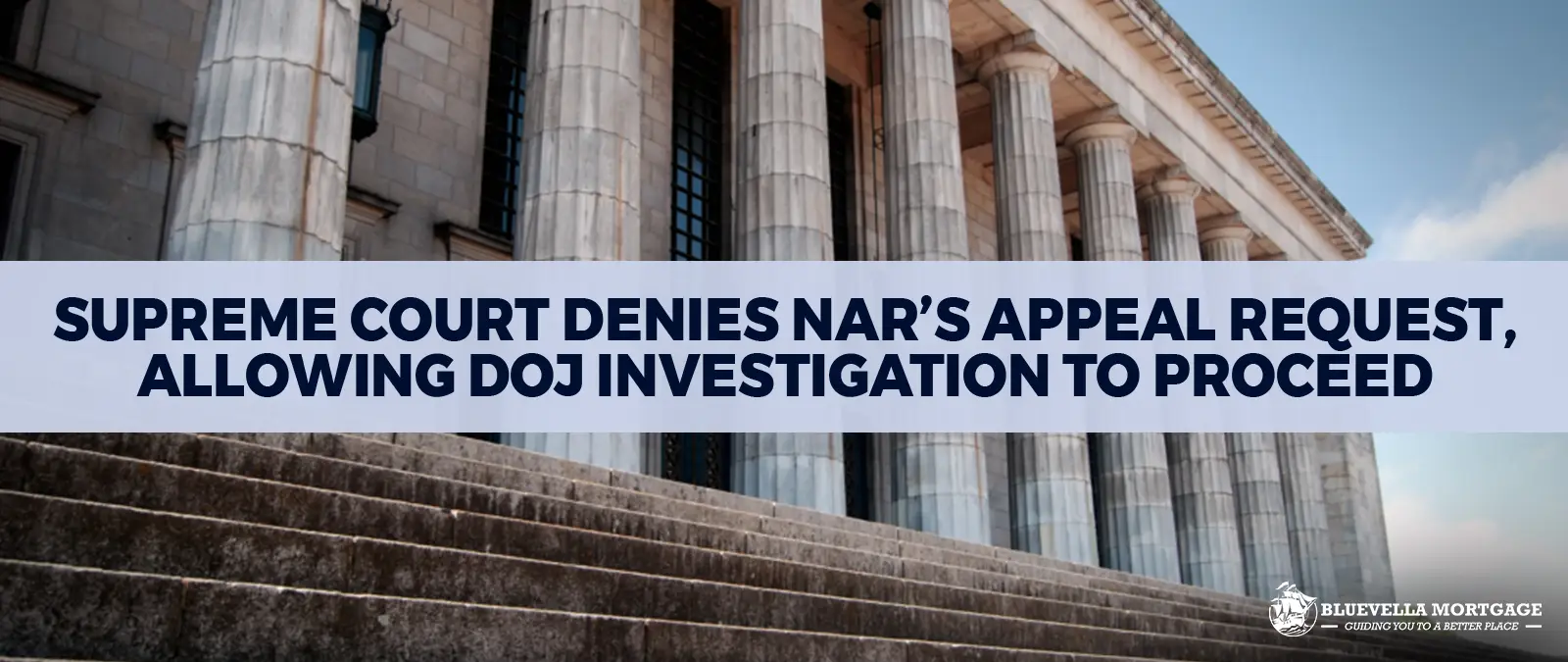Introduction – Implications for DOJ Investigation
The recent decision by the Supreme Court to deny the National Association of Realtors’ (NAR) appeal request marks a significant moment in ongoing legal proceedings concerning real estate practices in the United States. This development arises from a complex legal environment where various allegations have been raised regarding potential anti-competitive behaviors within the real estate sector. The NAR sought to challenge the findings that may implicate it in practices that could be seen as violating antitrust laws.
The impetus for this legal challenge stems from a broader investigation being conducted by the Department of Justice (DOJ). The DOJ’s inquiry focuses on the NAR’s policies and structures, specifically examining whether their rules serve to inflate costs for consumers and inhibit competition among real estate agents and brokerages. The decision to deny the NAR’s appeal allows the DOJ’s investigation to continue unabated, potentially leading to significant reforms within the industry.
This ruling is not only pivotal for the NAR, but also for thousands of real estate professionals across the country, as well as consumers who engage with their services. The implications extend beyond the immediate case; they may also alter the regulatory landscape for real estate transactions. Observers are keenly watching how this situation unfolds, as it may introduce new standards or practices that govern the real estate market in the future.
The denial of the appeal signifies an endorsement of rigorous scrutiny into the practices of major real estate associations. As the DOJ progresses with its investigation, stakeholders await clarity on how these developments could reshape the operational framework of the real estate industry, ensuring that it promotes fair competition while safeguarding consumer interests.
Also read: Real Estate: Updates by NAR for Realtors
Background of the Case
The backdrop of the Department of Justice (DOJ) investigation into the National Association of Realtors (NAR) is rooted in significant allegations concerning unfair business practices within the real estate industry. The investigation began to gain traction in mid-2019 when reports emerged that the NAR’s policies potentially inhibited competition and created a disadvantage for consumers. These allegations prompted the DOJ to scrutinize various NAR practices that were viewed by some as detrimental to fair market operations.
One of the primary concerns revolved around NAR’s Multiple Listing Service (MLS) rules, specifically practices that required sellers to offer commission to buyer agents. Critics argued that these rules effectively inflated costs for home buyers, thereby restricting their ability to negotiate prices freely. The overarching accusations suggested that such practices contributed to a climate of less competition, which might contravene federal antitrust laws designed to encourage healthy market competition.
As the investigation unfolded, NAR sought to mitigate its legal troubles by employing various tactics. These included filing motions to dismiss the case, arguing that the DOJ’s allegations were unfounded and mischaracterized their business model. Over the course of 2020 and 2021, NAR engaged in multiple legal maneuvers attempting to safeguard its policies, which it contended were pro-consumer and widely accepted within the industry.
However, the legal journey did not unfold as NAR had hoped, as the DOJ maintained its stance and pursued the investigation vigorously. The culmination of this process led to a significant moment when NAR’s appeal was ultimately denied by the Supreme Court in 2023, marking a pivotal point in the ongoing scrutiny of its practices. This decision underscored the DOJ’s commitment to addressing potential antitrust violations within the real estate sector, opening the door for further examination of realty practices and regulations.
Also read: National Association of Realtors (NAR) Lawsuit
Supreme Court’s Decision Explained
The recent ruling by the Supreme Court to deny the National Association of Realtors (NAR) appeal has considerable implications for the ongoing investigation led by the Department of Justice (DOJ). This decision stems from NAR’s attempt to contest the legal actions taken against it regarding anti-competitive practices in the real estate market. The court’s denial indicates its agreement with previous judicial findings that there is sufficient evidence for the DOJ’s probe into potential violations of antitrust regulations.
This ruling brings to light the legal framework that the Supreme Court utilized when reaching its conclusion. The court emphasized the necessity for competition within the real estate sector, an area where NAR has previously faced scrutiny due to its policies. The appellate judges highlighted that the evidence brought forth suggested not only the possibility of anti-competitive behavior but also the need for rigorous examination of the marketplace. This perspective reflects a broader judicial interpretation that prioritizes consumer welfare and market fairness over association interests.
Furthermore, NAR’s ability to contest the ongoing DOJ investigation appears to be diminished following this ruling. With the Supreme Court denying its appeal, NAR must comply with the DOJ’s inquiries and provide the necessary documentation and information. The court’s decision could ultimately accelerate the investigation process, potentially leading to significant changes in NAR’s operational policies to align with antitrust standards. In the long term, if the investigation results in findings of wrongdoing, it may compel NAR to undertake substantial reforms to maintain compliance with regulatory expectations.
Impact on the Real Estate Industry
The recent decision by the Supreme Court to deny the National Association of Realtors’ (NAR) appeal request has significant implications for the real estate industry. This ruling not only reinforces the ongoing Department of Justice (DOJ) investigation but also prompts a reevaluation of practices within the real estate sector. Realtors, who traditionally have employed various commission structures, may now face increased scrutiny and regulatory changes that could alter their business models.
One of the most pressing impacts of this decision is the potential modification of commission structures that have long governed real estate transactions. The current climate may lead to a shift towards more transparent pricing models, driven by the need to enhance consumer trust. As buyers and sellers become more informed and demand greater accountability from realtors, it is likely that we will see a rise in competitive transparency, which can ultimately benefit consumers seeking clarity in their financial commitments.
Moreover, the Supreme Court’s ruling could reshape the relationship between realtors and their clients. Realtors may be required to adopt practices that prioritize consumer interests, aligning with regulatory expectations. This shift might inspire greater industry compliance, ensuring that real estate professionals uphold higher standards of practice. Consequently, these changes can foster a stronger sense of trust between consumers and real estate agents, which has long been an issue within the industry.
Overall, the denial of NAR’s appeal introduces a wave of uncertainty regarding the future of real estate regulations. Real estate professionals may need to adapt quickly to the evolving landscape, recalibrating their strategies and practices to align not only with existing regulations but also with the growing demand for transparency and ethical practices. The industry stands at a crossroads where the potential for transformation is significant, signaling a new era for realtors and consumers alike.
DOJ Investigation: What’s Next?
The recent decision by the Supreme Court to deny the National Association of Realtors’ (NAR) appeal marks a significant turning point in the ongoing investigation led by the Department of Justice (DOJ). With the road cleared for the DOJ to proceed without further legal obstacles, the focus now shifts to the next steps in this high-profile inquiry.
The scope of the DOJ’s investigation is likely to remain broad, examining various practices within the real estate industry that may be in violation of antitrust laws. This includes scrutinizing commission structures, the enforceability of exclusive agreements among agents, and the overall transparency of real estate transactions. As the DOJ continues its examination, industry stakeholders and legal experts will be closely watching for any indication of systemic abuses that could affirm the need for regulatory reforms.
In terms of timelines, the DOJ typically approaches investigations methodically, balancing the need for thoroughness with expediency. Based on past inquiries, stakeholders may expect preliminary findings within the next few months, though comprehensive results may take longer. Legal analysts speculate that the DOJ could issue subpoenas for documentation and witness testimony, further lengthening the process but potentially revealing crucial insights.
As for significant actions that the DOJ may take against NAR, this could range from settlement negotiations to potential litigation, depending on the evidence collected and the overall strategy adopted. The department’s findings may necessitate substantial changes in realtor practices or organizational structures within NAR to foster compliance and mitigate any perceived anti-competitive behavior.
Overall, the DOJ’s investigation represents not just a challenge for NAR, but an opportunity to reshape how real estate markets operate, emphasizing fairness and transparency for consumers. Stakeholders will be closely monitoring the outcomes as they unfold, particularly regarding their implications for industry standards and practices in the future.
Responses from NAR and Other Stakeholders
The recent decision by the Supreme Court to deny the National Association of Realtors’ (NAR) appeal has elicited a range of responses across the real estate sector. NAR officials expressed disappointment in the ruling, emphasizing their commitment to advocating for real estate professionals and protecting their interests. In a statement, NAR reiterated its position that the practices under investigation are fundamental to maintaining a competitive market. The association also suggested that the ongoing Department of Justice (DOJ) investigation could misrepresent the realities of the real estate industry, potentially undermining consumer choice.
Moreover, various real estate professionals offered insights regarding the implications of the court’s decision. Some agents reported concerns about the possibility of increased regulatory scrutiny and how it might affect their business practices. Others, however, voiced support for the ruling, believing it may foster a more transparent marketplace. These differing opinions reflect a divided stance within the industry, as stakeholders navigate a constantly evolving landscape shaped by legal challenges and regulatory adjustments.
Legal experts have also weighed in on the implications of the Supreme Court’s decision. Many view the ruling as a pivotal moment for the real estate sector, with some arguing that it may set a precedent for future cases involving antitrust concerns. According to these experts, the denial of NAR’s appeal underscores the judiciary’s willingness to examine industry practices more closely, particularly regarding how commission structures and relationships between agents and brokers function. This perspective suggests that stakeholders must stay vigilant as they adapt to an environment where regulatory compliance could become more stringent.
In conclusion, the responses to the Supreme Court’s refusal to hear NAR’s appeal highlight the complexities faced by the real estate sector. As industry stakeholders react and adjust to this pivotal moment, the repercussions of this ruling may ripple throughout the market, influencing not just NAR’s strategic direction, but also informing broader discussions about regulation and competition in real estate.
Comparison to Similar Cases
The legal landscape surrounding regulatory actions often reveals patterns and precedents that can inform ongoing cases like the one involving the National Association of Realtors (NAR). To better understand the implications of the Supreme Court’s recent denial of NAR’s appeal request, it is valuable to examine other notable legal cases where regulatory agencies were involved in similar disputes across various industries.
One such case is the Federal Trade Commission (FTC) enforcement against the American Medical Association (AMA) in the late 1990s. The AMA faced allegations regarding anticompetitive practices that limited competition in the healthcare sector. After challenging the FTC’s actions, the case ultimately resulted in a landmark decision highlighting the necessity of regulatory scrutiny in ensuring fair competition. This decision underscored the role of federal oversight in health services, which shares parallels with the scrutiny faced by NAR in its regulatory landscape.
Another relevant case is the investigation into the technology sector’s compliance with antitrust laws. In the early 2000s, Microsoft Corp. was subject to an extensive DOJ investigation related to its licensing practices and market dominance. The court’s rulings mandated significant changes in Microsoft’s business operations, reinforcing the principle that adherence to regulatory frameworks is essential for maintaining competitive fairness. The outcomes of these legal battles have influenced subsequent investigations in the tech industry and can serve as a guiding reference as the DOJ examines the practices of NAR.
Additionally, the telecommunications industry faced regulatory challenges during the merger of AT&T and Time Warner. The Department of Justice took a firm stance, ultimately losing the case; however, the legal battle highlighted regulatory tenacity in scrutinizing mergers for potential anti-competitive behavior, reinforcing a regulatory emphasis that applies to cases like that of the NAR. The outcomes of comparable legal actions in various sectors illustrate the achievable consequences of regulatory oversight and draw valuable insights into how NAR’s situation may unfold.
Analysis of Legal Implications
The recent decision by the Supreme Court to deny the National Association of Realtors’ (NAR) appeal marks a significant moment in the discourse surrounding antitrust legislation and its enforcement in the real estate sector. This ruling not only reflects the Court’s stance on matters related to antitrust laws but also sets several potential legal precedents that could influence similar cases in the future. It underscores the increasing scrutiny faced by organizations that may engage in practices potentially deemed anti-competitive.
At the heart of the NAR case is the interpretation of antitrust laws, which aim to foster competition and prevent monopolistic behaviors. The Court’s decision is indicative of a broader trend toward a more aggressive application of these laws, particularly within industries that have historically operated with significant latitude. Legal experts suggest that this ruling may embolden the Department of Justice (DOJ) to pursue further investigations and enforce actions against other organizations that might violate antitrust principles.
Moreover, the implications extend to the evolving landscape of real estate practices. By denying the appeal request, the Supreme Court has signaled that it is willing to uphold challenges against practices that could restrict competition or manipulate market dynamics. Legal commentators posit that this case could serve as a reference point for future litigations, potentially leading to a re-examination of longstanding practices within the industry.
In light of these developments, stakeholders within the real estate sector must remain vigilant. Whether addressing commission structures or other operational practices, a reevaluation of compliance and competitive strategies may be essential. The broad expert consensus suggests that further antitrust challenges could arise, ensuring that the dialogue surrounding fair competition in real estate remains at the forefront of legal and regulatory considerations.
Conclusion
The recent decision by the Supreme Court to deny the National Association of Realtors (NAR)’s appeal request marks a pivotal moment in the ongoing investigation by the Department of Justice (DOJ) into the practices of the real estate industry. This ruling not only solidifies the DOJ’s position but also serves as a strong message regarding the scrutiny of potential anti-competitive behaviors in the real estate sector. The implications of this decision are significant, as it suggests a regulatory environment that may become increasingly vigilant in ensuring fair practices within the market.
The NAR has historically played a substantial role in shaping real estate practices, including the commission structures and the rules governing the conduct of realtors. As the Supreme Court upholds the DOJ’s actions, the association may be forced to reevaluate its protocols and the existing norms within the industry. This shift could lead to potential changes in how real estate transactions are conducted, ultimately affecting buyers, sellers, and realtors alike. Stakeholders should prepare for possible adjustments to policies that will emerge as the DOJ continues its investigation.
Furthermore, it is crucial to consider the broader implications of this ruling on consumer rights and market competition. Enhanced transparency and fair practices are anticipated as the oversight of the real estate industry adjusts to the current legal landscape. As the situation progresses, observers should monitor new developments, including any subsequent actions taken by the NAR, responses from industry stakeholders, and potential legislative changes aimed at fostering a more equitable marketplace.
In conclusion, the Supreme Court’s ruling serves as a watershed moment for real estate practices and regulatory enforcement. The implications of the decline of NAR’s appeal extend beyond this singular case, promising to influence market dynamics and public policy within the real estate sector for the foreseeable future.
Source: Supreme Court Denies NAR’s Appeal Request: Implications for DOJ Investigation




